- Home
- A. S. King
Please Ignore Vera Dietz Page 2
Please Ignore Vera Dietz Read online
Page 2
When I turned thirteen, Dad told me the truth about Mom.
“I’m sure this will never come up, but in case it does, I want you to know the truth.”
Make a note. When a conversation starts out like this, brace yourself.
“When you were just a little baby, your mother took a job over at Joe’s.”
Of course, this meant nothing to me. I was thirteen. I had no clue that Joe’s was a bring-your-own-beer strip joint where women danced around half naked getting dollar bills stuffed into their panties.
“What’s Joe’s?”
With no shame or recognition of how badly I could take this, my father said, “A strip club.”
I knew what that was.
“Mom was a—a stripper?”
He nodded.
“And people know this?”
“Just people who were around back then—whoever knew her.” He struggled a bit then, seeing how disgusted I was. “It was only for a few months, Vera. She wanted her freedom back after dropping out of school, getting kicked out of her house, and having—uh—a baby so young. I was still drinking then. She wanted something that she never got back,” he said. The words came out garbled and stuttery. “She—she—uh—wanted something she never found until she ran off with Marty, I guess.”
Marty had been Mom and Dad’s podiatrist.
Dad and I used to sit in the waiting room and play twenty questions during Mom’s longer-than-normal appointments for verrucas.
Dad still hits an AA meeting when he needs to. He says it’s a curse—alcoholism. Says I should never even try the stuff because the curse runs in our family. “My father was a drunk, and so was his father.”
Well, if it’s as easy as catching my future from a blood relative, then I guess I’m due to be a drunk, pregnant, dropout stripper any day now.
THURSDAY—FOUR TO CLOSE
Around 5:15 the dinner rush starts. Nothing we can’t handle. It begins with phone #2 ringing while Marie is taking an order on phone #1. Soon after, while Jill’s taking an order on #2, #3 rings. Running the store becomes a blur until about seven.
There are three drivers working, and we manage to time ourselves so that only one of us is in the shop at a time. Marie organizes the runs and has the next one waiting for us when we come in, and is able to remember which order gets Coke, which order gets Sprite, and which order gets a tub of coleslaw. For two hours, I am a driving, knocking, smiling, change-making machine. I am a natural at this. My Pagoda Phone never rings, because I never forget anything. Customers like me and give me tips, which I stuff into a crumpled, waxy Dunkin’ Donuts bag I keep on the floor behind my seat.
On my way home from my last run, Charlie makes me eject Dad’s Sam Cooke CD and turn on the radio. He makes me put on Hard Rock 102.4, where they’re playing a song I hate by AC/DC, but I listen to it anyway.
I take a left into the McDonald’s and line up for the drive-thru. I’m addicted to the new wraps they have on their good-for-you menu, with the grapes in them, but I always get a chocolate shake, so it’s not like I’m trying to be healthy or anything.
“Go to the first window.”
She’s waiting there with her hand out. Doesn’t she know that people need a minute to get their money ready? She rolls her eyes as I dig through my Dunkin’ Donuts bag for five singles. She doesn’t say thank you.
“Go to the second window.”
Rather than go back to Pagoda Pizza to eat, I circle the parking lot and find a darkened spot between floodlights. I leave the car running for the heater. It’s cold tonight. Second week of December and I’ve been using my ice scraper every morning this week. As I eat, a grape keeps jumping from my wrap onto my lap, where I’ve laid out a few napkins. I pick it up and pop it into my mouth, but it jumps out again, as if it’s being controlled by a string and not just fumbled by my slippery fingers.
“Cut it out, Charlie,” I laugh.
I pluck the grape from my lap, grip it tightly, and place it in my mouth.
I eat half the wrap and feel full, so I roll it in its wrapper and stuff it back in the bag, and I collect the napkins from my lap and stuff them in, too. There are four leftover napkins on the passenger’s seat, and I press the button to open the glove compartment, where there are at least a hundred napkins, and I layer in four more and close it.
Then I open it again, retrieve one, and grab a fine-point Sharpie marker from my purse. In the dim glow of McDonald’s parking lot floodlights, I write I miss you, Charlie on the corner, then fold it up and put it in my pocket. I imagine him watching me do this. I half feel his disappointment that I didn’t burn it or eat it or any of the other things he would do with his scribblings.
I circle around the back of the building toward the drive-up trash receptacle and see how many bags missed the mark, how many spills are down the front of it, how many drivers just left their crap there to blow away in the wind rather than open their door and try again. I drive up to it, toss in the bag, and then drive out onto the main strip, toward Pagoda Pizza. A block away, I retrieve the napkin from my pocket, rip off my message, and place it on my tongue. It sticks. I reach under my seat and grab the bottle. I take a gulp, breathe the heat out of my throat, and chase it with a big mouthful of chocolate shake.
Before I leave the car, I pull out my Vocab list for the week. Tomorrow is Friday—test day. This is one of the reasons I love Vocab class. Every week is the same. There are no deviations from the class schedule. List on Monday, sentences due Wednesday, test on Friday. Every student knows what to expect. I wish Mrs. Buchman ran the world so life would be as easy.
THURSDAY—FOUR TO CLOSE
It’s past nine. We’re down to the closing crew—two drivers, a pizza maker/prep cook, and Marie.
“Vera—are you doing the town run?”
I look around. I’m the only driver in. “I guess so.”
“Can you wait a second and drop this one off on your way?”
It’s Fred’s Bar, on the last corner before the bridge into town. I check the times on the other orders and do the math. Thirty minutes isn’t as long as you think. It takes about fifteen minutes to make the pizza, so I only have fifteen minutes to get it to the door. Stopping at Fred’s Bar will kill my whole town run.
“I’ll be late for the Cotton Street place.”
Marie whips the Fred’s Bar pizza out of the oven early (the crust isn’t quite brown), slaps it into a box, and cuts it into triangular slices. “The Cotton Street people can kiss my ass if they have a problem,” she says.
I pack the three town orders in separate hot bags, grab a six-pack of Coke and a six-pack of Sprite, and load up the car.
On my way out, James returns from his last run. I have a crush on James, but he’s twenty-three, so I shouldn’t. But I’m lonely since Charlie died, and James has that familiar smoker smell. And he’s cute and he likes to listen to the same kind of music as me. He calls it eclectic, which is better than what the assholes at school call it.
I drive down the empty, sloped parking lot to the main strip and take the left into town. When I get to Fred’s Bar, I pull over, two tires on the curb, and stick my flashers on. I grab the red-and-black-checkered hot bag with their order and open the door to the smoky, dingy dive and Tammy Wynette singing “Stand by Your Man.” I probably deliver to Fred’s three nights a week, and two of those nights, Tammy Wynette is playing, and no matter how much good music I play afterward, the song sticks in my head.
But the real reasons I hate going into Fred’s Bar are: The regulars stare and give me the creeps. Ninety percent of the time, they forget to tip me. There are pinball machines in the back and it reminds me too much of the bar where very bad things happened to Jodie Foster’s character in The Accused.
I drive over the bridge into town. The whitest town on Earth—or, more accurately, once the whitest town on Earth until the Mexicans moved in. Once you get through the crowded old suburbs where the large Victorian homes sit on the hill and past the rows of cu
pola-topped row houses, it’s an ugly town—a mishmash of 1940s asphalt shingles, multicolored bricks, and gray concrete. There’s too much litter, and too many people look angry. Dad says it wasn’t always like this. He says it’s not the Mexicans’ fault that the city council would rather spend the city’s money on new arts initiatives and a big, flashy baseball stadium than more police on the streets. So now, while there’s wine, cheese, and doubleheaders downtown, poverty has taken over and crime is at an all-time high uptown. I lock my doors. It’s bad enough that my middle-class car (with the PRACTICE RANDOM ACTS OF KINDNESS bumper sticker) draws attention, let alone the suction-cup Pagoda Pizza flag on the roof.
I get to the railroad tracks and when I slow down to clear them, a drugged-up woman comes out of the shadows and pulls her sequined boob tube down, and I look at the road and keep driving. I try not to think of my mother and make a mental note to stop taking Jefferson Street into town.
The Cotton Street order is a minute late, but they don’t seem to notice or care. The guy doesn’t even look at me, and gives me a twenty and mumbles, “Keep the change,” which translates into a two-dollar-and-four-cent tip for me. Rare for a town run. Two more stops on my way back to the store—one family with hyperactive children who pocket a dollar of my tip, and one old man who ordered a large hot Italian sandwich and pays in exact change. He smiles at me and cocks his head upon realizing I’m a girl.
“Be careful,” he says.
I drive back the long way, over the mountain on the dangerous S curves, toward the enormous, glowing, gaudy pagoda that watches over our town. Most people think the pagoda is a cute tourist attraction and a quirky addition to our otherwise boring little nowhere city. I think it’s a monstrosity. But then, I grew up just down the road from it, and I know the story behind it. As I climb the hill and shift down, the motor roars with effort. I finally reach the top, pass the red neon eyesore, and coast down Overlook Road, past my house.
The light in the den is on and I can see the morphing glow of the television. Dad is probably ignoring whatever muted movie is on Channel 17 while skimming the day’s paper. He never turns the sound on when he doesn’t have to. I asked him once why he doesn’t just turn the TV off.
“Something about it makes me feel like I’m not alone,” he said.
I bet there are millions of people who’d agree with him, too. Not me. I’d rather feel something for real than pretend it’s not what it is. (Which Zen guy said, “If you want to drown, do not torture yourself with shallow water”?)
A BRIEF WORD FROM KEN DIETZ (VERA’S DAD)
My mother did the best she could by herself. Didn’t stop me from becoming an alcoholic. Didn’t stop me from dropping out of high school and knocking up the seventeen-year-old girl next door. Didn’t stop me from wondering what life would have been like with a father, either. I think losing a parent robs confidence from a kid. With Vera, I’m trying to find ways to teach her how to grow her own self-esteem. I’m not sure if it’s working, but it’s all I have. Because my father left when I was three, I have no idea what a father is supposed to do, so I’m winging it.
One day, when I was a kid, I found a videotape of The Midnight Special TV show from 1973 at the bottom of my mother’s underwear drawer. That was back when she used to work as a secretary at the local plumbing contractor’s office. I read the label on the front. It said CALEB SR., which was what she called my dad on account of my oldest brother being Caleb Jr. I popped it into the VCR and watched it. Billy Preston played a few numbers, and behind him was my dad, a long-haired skinny white hippie playing his horn. Aside from a few pictures in worn envelopes, this was all I would ever have of him because when he left, he didn’t leave a phone number or an address. I watched that tape until it finally wore through. I bought every Billy Preston album there was, and grew my hair long.
Vera doesn’t know how lucky she is to have had the most important years of her life with her mother.
About two months before Cindy Sindy found out she was pregnant with Vera, we went up to the pagoda and climbed out onto the rocks perched high above the city. We’d been dating on and off since junior high, but had only just started to take it to the next level, in the back of my crappy Ford Tempo. Cindy Sindy was a year younger than me, so I was eighteen at the time and she was seventeen.
“Do you know the story of this place?” I said.
“I think you mean, do I care?” she said, folding her homework sheet into a paper airplane.
“You live in this town and you don’t know the pagoda story?”
“Nope.”
“Do you want me to tell you?”
“Nope,” she said, snapping her gum.
She launched the airplane and it caught a current and circled down toward the town, like a promise of something good. We watched it together until we couldn’t see it anymore. I held my hand out for a piece of homework. She gave one to me and started folding the next one. We flew homework airplanes for two hours, daydreaming about who would find them and where they’d land and wondering if anyone would see them in flight, like we were seeing them. Free. Daring and swooping with the currents—the way we felt as teenagers in love.
Then Vera came.
The beginning was hard, but we got through it. Once I quit drinking and started making decent money at the little accounting firm I’d interned with, we bought the house on Overlook Road. Cindy Sindy said it was sacred because it was so close to the pagoda, even though she never cared enough to hear its sordid (and very not-sacred) history, and I liked it because it was secluded and far away from the trashy suburb we’d both grown up in. The three of us climbed trees and planted gardens together. Cindy Sindy raised a brood of chickens one year and sold the organic eggs at the local farmers’ market. We taught Vera about nature and ecology. We took walks, hiked, and stayed healthy.
Then, when Vera was twelve, Cindy Sindy left me. She never called or wrote or cared again—just like my dad.
When Vera turned sixteen, four years after Cindy Sindy left, I brought her up to the pagoda and flew paper airplanes with her. I asked her if she wanted to know the story of how the pagoda was built, and she said yes. So I told her, and it was like everything was right in my life again. I watched the planes soar down toward the city, and I felt redeemed and whole. I remember thinking, Kenny Dietz, you have finally grown up, son.
I estimate that I spent over $2,300 on self-help books, workshops, and videos to make myself into the man Cindy Sindy wanted me to be. But all it really took was seeing Vera all grown up—nearly the same age as her mother when we sat in the very same spot, doing the very same thing.
She asked me about her grandfather, and I showed her The Midnight Special Billy Preston video on YouTube, and she thinks I look like him. I don’t think I do, because I got my mother’s brown hair, but she claims I have my father’s eyes. Either way, I became an alcoholic like he was, the same as his father was, which my mother told my brothers and me about five years too late. That’s why I’m telling Vera everything about me and Cindy Sindy now. I’m giving her a chance to evade her destiny. The trick is remembering that change is as easy as you make it. The trick is remembering that you are the boss of you.
KEN DIETZ’S AVOIDING YOUR DESTINY FLOW CHART
A BRIEF WORD FROM THE PAGODA
Technically, flying paper airplanes from here is littering. Littering brings a $300 fine, even if you use it as a metaphor for finding yourself. (And who are you calling a monstrosity? Please. You should have seen this mountain when the quarrymen finished with it in 1905. It was like a pile of shale shit. Seriously—you don’t know the meaning of eyesore.)
THURSDAY—FOUR TO CLOSE
When I get back to the store, it’s nearly ten and Jill, the resident stuck-up-ex-cheerleader-turned-food-service-worker, is in the back, doing prep work. She’s made a big vat of dough and is weighing it, shaping it into balls, and plopping it into trays that will go into the freezer for tomorrow’s pies.
Marie’s in the o
ffice finishing the part-time drivers’ cash-out receipts, smoking a long menthol cigarette, and listening to a hard rock radio station. “Free Bird” comes on and she turns it up. James is on the back steps, folding pizza boxes. I see he’s working on large ones, so I haul up a flat-packed stack of small boxes, grab the utility knife, cut away the plastic binding, and get comfortable next to James, with the stack to my left. Sometimes, when the part-time drivers are here and there are no runs to take, we have contests. I can fold a box in four seconds. My fastest time yet was thirteen in one minute. James has me beat by one, with fourteen.
But we don’t rush now.
Jill passes us to go to the bathroom and gives a raised eyebrow, as if to say that we’re sitting too close, and James, for kicks, waits for the toilet-flush sound and slides right into my hip and puts his strong arm around me. When Jill walks out, he gives me a kiss on my cheek and makes a loud heavy-breathing sound and Jill rolls her eyes and throws her hands up. James doesn’t know that his breath in my ear is the nicest thing I’ve ever felt in my life, and when I blush, he’s too busy rocking out to the end of “Free Bird” to notice.
It’s a bland Thursday night and the phones are quiet. There are no sports on TV. We’ll be lucky to make one pizza between now and midnight, when we officially close. We finish folding our fifty boxes apiece and start on closing duties.
“You want cooler or dishes?” James asks, taking a broom handle to the stack of ready boxes to straighten the tower we’ve made.
I hate both. “I can’t face the dishes again tonight.”
So I move to the front of the store and start stocking the cooler with six-packs and occasionally catch a glimpse of myself in the huge plate-glass windows that make up the front wall. I’m there for about ten minutes before the door opens and a thousand Charlies come in.

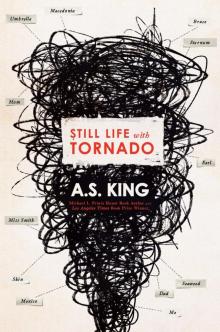 Still Life With Tornado
Still Life With Tornado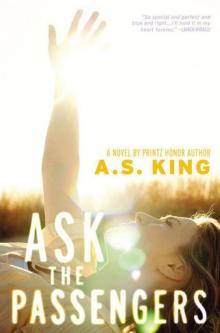 Ask the Passengers
Ask the Passengers Glory O'Brien's History of the Future
Glory O'Brien's History of the Future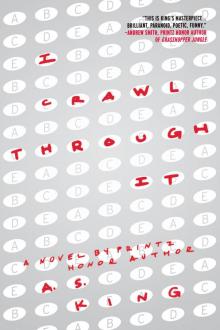 I Crawl Through It
I Crawl Through It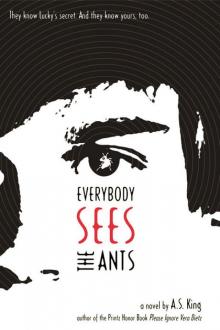 Everybody Sees the Ants
Everybody Sees the Ants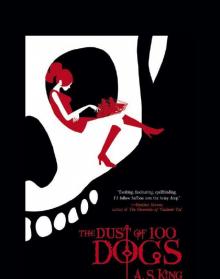 The Dust of 100 Dogs
The Dust of 100 Dogs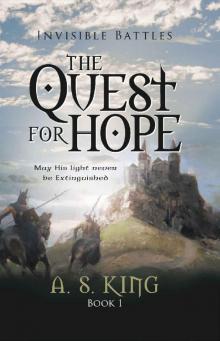 The Quest for Hope | Christian Fantasy Adventure (Invisible Battles Book 1)
The Quest for Hope | Christian Fantasy Adventure (Invisible Battles Book 1)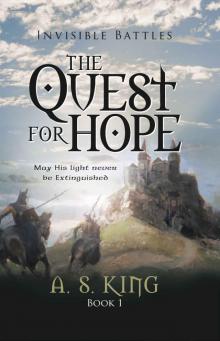 The Quest for Hope | Christian Fantasy Adventure
The Quest for Hope | Christian Fantasy Adventure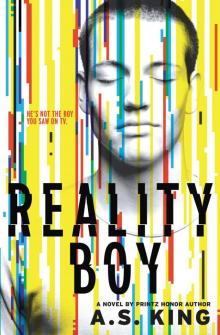 Reality Boy
Reality Boy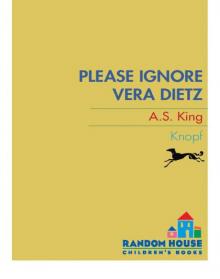 Please Ignore Vera Dietz
Please Ignore Vera Dietz